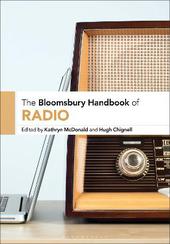
|
The Bloomsbury Handbook of Radio
Hardback
Main Details
| Title |
The Bloomsbury Handbook of Radio
|
| Authors and Contributors |
Edited by Kathryn McDonald
|
|
Edited by Professor Hugh Chignell
|
| Series | Bloomsbury Handbooks |
|---|
| Physical Properties |
| Format:Hardback | | Pages:568 | | Dimensions(mm): Height 254,Width 178 |
|
| Category/Genre | Radio |
|---|
| ISBN/Barcode |
9781501385315
|
| Classifications | Dewey:791.4409 |
|---|
| Audience | | Professional & Vocational | |
|---|
|
Publishing Details |
| Publisher |
Bloomsbury Publishing Plc
|
| Imprint |
Bloomsbury Academic USA
|
| Publication Date |
23 February 2023 |
| Publication Country |
United States
|
Description
The Bloomsbury Handbook of Radio presents exciting new research on radio and audio, including broadcasting and podcasting. Since the birth of radio studies as a distinct subject in the 1990s, it has matured into a second wave of inquiry and scholarship. As broadcast radio has partly given way to podcasting and as community initiatives have pioneered more diverse and innovative approaches so scholars have embarked on new areas of inquiry. Divided into seven sections, the Handbook covers: - Communities - Entertainment - Democracy - Emotions - Listening - Studying Radio - Futures The Bloomsbury Handbook of Radio is designed to offer academics, researchers and practitioners an international, comprehensive collection of original essays written by a combination of well-established experts, new scholars and industry practitioners. Each section begins with an introduction by Hugh Chignell and Kathryn McDonald, putting into context each contribution, mapping the discipline and capturing new directions of radio research, while providing an invaluable resource for radio studies.
Author Biography
Kathryn McDonald is a Principal Academic at the Faculty of Media and Communication, Bournemouth University, UK. Her research, practice and teaching are focused on broadcast talk, community engagement and audio production. McDonald has worked as a radio producer, led the BA Radio Production degree, and now teaches across undergraduate and postgraduate courses. Hugh Chignell is Emeritus Professor of Media History at the Faculty of Media and Communication, Bournemouth University, UK. He taught on the MA Radio Production and BA Radio and was director of the Centre for Media History. Chignell has published widely on radio including Key Concepts in Radio Studies (2009), Public Issue Radio (2011) and British Radio Drama 1945-63 (Bloomsbury 2019).
ReviewsThe editors brilliantly bring together a range of influential and engaging scholars and practitioners of radio, not just to define and map areas of radio studies such as listening, communities or entertainment, but also to set the agenda for the future investigation of radio and audio cultures. This handbook understands radio not only as (still) an incredibly powerful media, but also as a burgeoning audio culture and field of research. This handbook is compelling and useful and will serve both scholars and practitioners. * Tiziano Bonini, Associate professor in Sociology of Culture and Communication, University of Siena, Italy * This is a superbly wide-ranging collection with a wealth of approaches and methodologies, with a particular emphasis on radio and audio production scholarship. Contributors include new and well-established authorities who explore historical and contemporary radio and sound practices on a scale that is both global and intimate. This collection represents essential reading for scholars and a comprehensive introduction to students new to the field of Radio and Podcast Studies. * Leslie Grace McMurtry, Lecturer in Radio Studies, University of Salford, UK * The Bloomsbury Handbook of Radio tours the globe for an important and innovative examination of entertainment, listening, emotions, communities, democracy, radio research, and futures. The contributions from Australia, Brazil, Canada, and the United Kingdom brings life to contemporary research that crosses borders with shared research foci. The inclusive nature of lived experience, archival research, and analysis that ranges from early radio to podcasting will have a significant impact in radio studies for decades to come. Congratulations to all the contributors and the editors, Kathryn McDonald and Hugh Chignell. * Anne F. MacLennan, Associate Professor, York University, Canada *
|